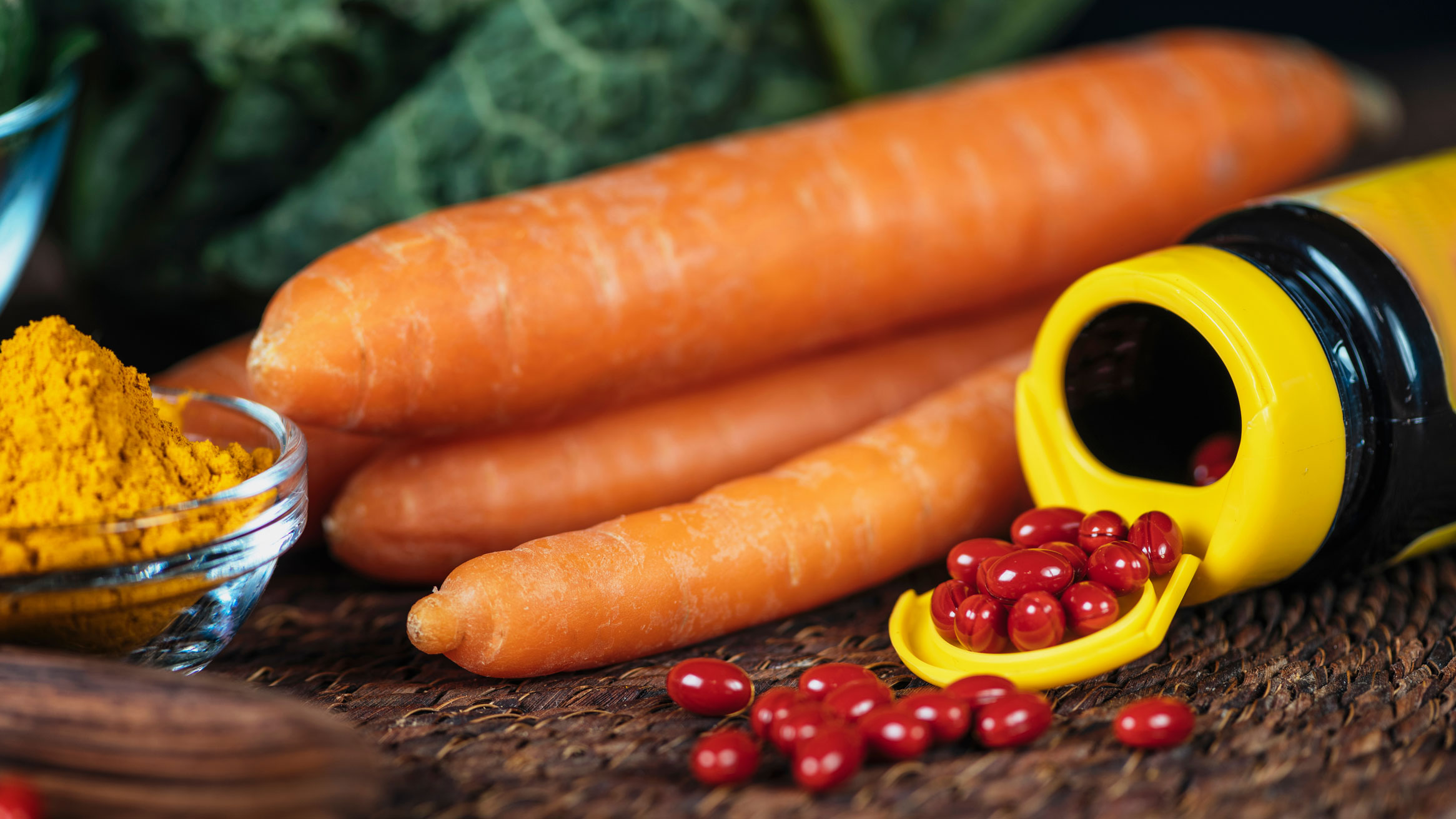As you walk through the grocery aisle and your eye catches the vibrant array of colors bouncing off the red, orange, and yellow bell peppers, sweet carrots, and dark-green leafy spinach, the pigment your eye is picking up is beta carotene. A powerful antioxidant, beta carotene is one of the carotenoid compounds that give fruits and vegetables their beautiful array of colors.
Many foods contain beta carotene that you are probably already eating regularly. The following is a list of foods that are rich in beta carotene:
- Asparagus
- Broccoli
- Carrots
- Grapefruit
- Herbs: Chili Powder, Oregano, and Paprika
- Kale
- Onions
- Spinach1
What Are The Benefits Of Beta Carotene
When ingested, beta carotene is converted into fat-soluble Vitamin A. This nutrient is essential for many processes of the body, including the following:
- Cell Division
- Antioxidant Properties
- Vision Health
- Reproductive Health
- Growth
- Immunity2
Beta Carotene As An Antioxidant and Oxidative Stress
As mentioned above, beta carotene is a potent antioxidant. Other antioxidants are Vitamins C and E and can also be found in a plethora of foods such as blueberries, broccoli, and winter squash. Ensuring that we eat enough foods or supplements containing antioxidants is vital to protect our cells against free radicals. An overabundance of free radicals in our body can contribute to multiple chronic diseases or conditions such as cardiovascular, inflammatory disease, and cancer3.
The way to rid our system of free radicals is by consuming antioxidants. Free radicals are naturally created in the body through the digestion process but are also produced from outside stressors such as smoking tobacco or radiation exposure. If free radicals build up in our system, it can lead to a condition known as oxidative stress.
The Effects Of Oxidative Stress
Oxidative stress occurs when antioxidant levels are low, and there is an imbalance of reactive oxygen (free radicals) and antioxidants. Antioxidant levels can be checked through the Oxygen Radical Absorbance Capacity (ORAC) test. It is crucial to have a steady diet of foods rich in antioxidants to keep free radical levels low. Oxidative stress can lead to a host of other diseases or conditions such as:
- Diabetes
- Cancer
- Cardiovascular disease
- Infectious diseases
- Parkinson’s disease
- Alzheimer’s disease
- Multiple sclerosis4
Oxidative Stress has a solution if you are aware of the foods or supplements to take to eliminate free radicals from the body on a regular basis. The top antioxidants to add to your diet are in the berry family: blueberries, raspberries, blackberries, and cranberries, but there are many other foods and supplements on the market that contain antioxidant properties.
Therapeutic Uses Of Beta Carotene
Mount Sinai has performed extensive studies with Beta Carotene, and their findings were very positive regarding the daily intake of this nutrient. The study showed that eating four or more servings of fruits and vegetables with an abundance of Beta Carotene may reduce the risk of developing cancer or heart disease5.
Since beta carotene is converted into Retinol or Vitamin A, it can positively affect our skin, immune system, and mucous membranes when taken as a supplement. Reviewing multiple studies has shown that regular long-term supplementation of this antioxidant-rich nutrient can positively affect memory, cognitive function, and macular degeneration.
Depending on one’s taste, some can get enough beta carotene from the foods they eat on a daily basis. If this is not the case, adding a supplement of beta carotene might be a good option for you. It comes in a powder form that could be added to smoothies and in easily swallowable capsules. Whichever way you prefer to obtain beta carotene, its nutrients and antioxidant properties will increase your overall health and decrease your risk for major chronic diseases.
References:
- All You Need to Know About Beta Carotene, https://www.medicalnewstoday.com/articles/252758#carotene_foods.
- The Health Benefits of Beta Carotene, https://www.verywellhealth.com/beta-carotene-5496833.
- Free Radicals, antioxidants, and Functional Foods, https://www.ncbi.nlm.nih.gov/pmc/articles/PMC3249911/#:~:text=Free%20radicals%20damage%20contributes%20to,or%20by%20promoting%20their%20decomposition.
- Oxidative Stress: Harms and Benefits for Human Health, https://www.ncbi.nlm.nih.gov/pmc/articles/PMC5551541/#:~:text=Oxidative%20stress%20has%20been%20linked,)%20%5B32%E2%80%9335%5D.
- Beta Carotene, https://www.mountsinai.org/health-library/supplement/beta-carotene.
